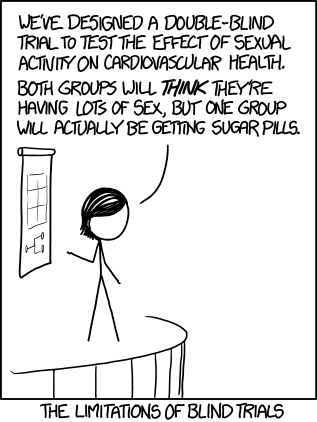1462: Blind Trials
| Blind Trials |
 Title text: Plus, you have to control for the fact that some people are into being blindfolded. |
Explanation
| This is one of 61 incomplete explanations: Created by a BOT - Please change this comment when editing this page. If you can fix this issue, edit the page! |
In research, a blind trial is an experiment where certain information about the test is concealed from the subjects and/or the testers, in order to reduce sources of bias in the results. A scientific approach requires the use of control groups to determine the significance of observations in (clinical) trials. The members of the control group receive either no treatment or the standard treatment.
A double-blind trial is one where neither the subject nor the testers know who has recieved treatment, and who is in the control group. It is vital that there are no clues available to distinguish between the different groups, either for the subjects or the testers. In a clinical drugs trial for example, it would not be suitable for some people to be given blue pills and others red pills, so an identical placebo pill should be used, typically a sugar pill with no medical value.
There are, however, certain cases where it is almost impossible to make the experience of the control group identical to that of the test group. In the described experiment, it will be challenging (to say the least) to make the control group think they are having lots of sex, when in fact they are just taking a sugar pill.
Scientific research involving humans is extremely challenging to conduct because of the difficulty in finding appropriate control groups. This is one of the reasons animal experiments (for instance involving inbred strains of mice) are so common.
The title text adds another twist by taking “blind” literally, and noting that for some people, being blindfolded increases their enjoyment of sexual activity.
Transcript
| This is one of 35 incomplete transcripts. Please help by editing it! |
- Megan: We've designed a double-blind trial to test the effect of sexual activity on cardiovascular health.
- Both groups will think they're having lots of sex, but one group will be actually getting sugar pills.
- The limitations of blind trials
Discussion
I think I finished the transcript 108.162.250.219 09:21, 19 December 2014 (UTC)
- I think the item Megan is pointing at should not be referred to as "chart", but as "charts", since a chart is "a sheet of information in the form of a table, graph, or diagram", while there is clearly both a table and a diagram, therefore two "charts".17jiangz1 (talk) 12:45, 19 December 2014 (UTC)
I wonder though, if it makes sense to account for Placebo Effect when you're mesuring something that does not involve subjective perception. In the example case, one can measure, say, heart rate for the group that practices sex and the monastic control group and have valid results. Of course, you lose the option of passing a survey with questions like "Have you lately felt tired?" or the like. 173.245.49.106 09:33, 19 December 2014 (UTC)
- Of course it does make sense, placebo effect can be observed on test for disease such as cancer. The idea is that thinking you are taking a cure might, will trigger physiological change. It is quitte likely, that the testing of pills for the heart would induce some placebo effect. What you might be refering too is some kind of perseptive bias, which could be observed in psychological test. 108.162.229.100 11:51, 19 December 2014 (UTC)
Hmmmm ... maybe you could make the control group think they have sex with hallucinogens ... but somehow I don't think it would make useful control group, not speaking about most hallucinogens being illegal. Alternatively, you can get both groups drunk and - ... ok, this doesn't sound like good idea either. -- Hkmaly (talk) 12:44, 19 December 2014 (UTC)
- I was thinking maybe hypnotherapy... --Pudder (talk) 12:48, 19 December 2014 (UTC)
- the only legitimate thing I could think of is to get the control group to use various forms of cardiovascular exercise to get a few measurable statistics (like heart rate, perspiration, respiration, blood pressure, etc) to be roughly equivalent to those experienced by the experimental group, then the experiment would be to show MOSTLY whatever else sex does (hormones, psychological stimulation, etc), if cancer susceptibility was shown to be lower in the experimental group, it MIGHT have some validity... it would be a fairly complex set of requirements to design and especially hard to control for things like sexual preference(s), but I could imagine a well-designed study being able to show a few things -- Brettpeirce (talk) 14:42, 19 December 2014 (UTC)
When I was diagnosed with accute hypochondria and then suffered a number of psychosomatic injuries, those sugar pills actually saved my life! 141.101.98.245 12:55, 19 December 2014 (UTC)
So, does a triple blind trial mean a threesome? Nialpxe (talk) 16:27, 19 December 2014 (UTC)
Just my luck - I'm in the second group! --RenniePet (talk) 03:18, 20 December 2014 (UTC)